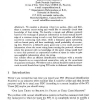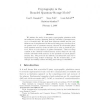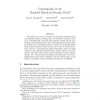62 search results - page 5 / 13 » Classical Knowledge for Quantum Security |
125
click to vote
EUROCRYPT
1995
Springer
15 years 5 months ago
1995
Springer
We coiisider a situation where two parties, Alice and Bob, share a common secret string arid would like to mutually check their knowledge of that string. We describe a simple and e...
103
click to vote
EUROCRYPT
2005
Springer
15 years 7 months ago
2005
Springer
It is a standard result in the theory of quantum error-correcting codes that no code of length n can fix more than n/4 arbitrary errors, regardless of the dimension of the coding ...
103
click to vote
FOCS
2005
IEEE
15 years 7 months ago
2005
IEEE
We initiate the study of two-party cryptographic primitives with unconditional security, assuming that the adversary’s quantum memory is of bounded size. We show that oblivious ...
118
click to vote
SIAMCOMP
2008
15 years 12 days ago
2008
We initiate the study of two-party cryptographic primitives with unconditional security, assuming that the adversary's quantum memory is of bounded size. We show that oblivio...
124
click to vote
TCC
2004
Springer
15 years 7 months ago
2004
Springer
Quantum 2-party cryptography differs from its classical counterpart in at least one important way: Given blak-box access to a perfect commitment scheme there exists a secure 1−2...



